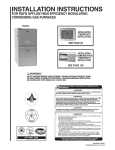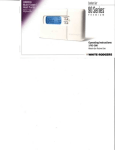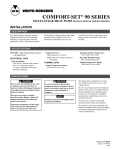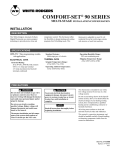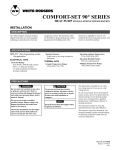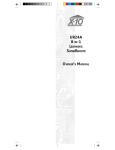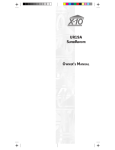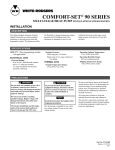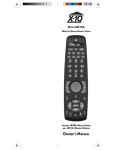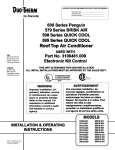Download INTRODUCTION Thank you for purchasing your new Comfort
Transcript
INTRODUCTION Thank you for purchasing your new Comfort-Set 90 Series thermostat. Your new White-Rodgers thermostat uses solid state microcomputer technology to provide precise time/temperature control. This thermostat offers the flexibility to design heating and cooling programs that fit your needs. Adaptable to most 24 volt residential forced air, multistage (1F95-377 or 1F95-371) or heat pump systems with electric or fossil fuel auxiliary (1F95-377 or 1F94-371). You will find information about thermostat buttons and display in the component section beginning on page 2. Instructions for optional thermostat configuration begin on page 4. Programming information begins on page 7. Descriptions of the thermostat’s features begin on page 13. We have also added thumb tabs to help you find sections of the manual. 1 Introduction Orientation Configuration Programming Features Index ORIENTATION THE THERMOSTAT BUTTONS See inside front cover for illustration showing button locations. 1 (Blue arrow) Lowers temperature setting (45°F or 7°C minimum) 2 (Red arrow) Raises temperature setting (99°F or 37°C maximum) 3 The multi-color indicator glows: green for 1st stage, yellow for 2nd stage, red for emergency heat and flashing red for malfunction condition in system. 4 This button (on top of the cover) lights the display. 5 Used to initiate or review thermostat programming or advance to next program period in programming mode. 6 Used with TIME BACK FWD /TIME 7 Used to adjust the time backward, or to select the previous menu item. 8 Used to adjust the time forward, or to select the next menu item. 9 Used with TIME BACK FWD /TIME to set the current day. 10 Used to advance operation to the next program period or advance to the next day in programming mode. 11 Used to manually override programming to hold at a selected temperature. 12 Used to enter and configure the VACATION mode. 13 Selects fan operation (see The Display 21 ). This button is also used to program the fan to run continuously during a program period. to set the clock. 2 14 Used to set the filter change-out time, or to reset the filter change timer. 15 Sets the system mode (HEATing, EMERgency (Heat Pump models only), OFF, COOLing, or AUTOmatic changeover). 16 Used to adjust the clock one hour forward or back. 17 Used to start or return to program operation. THE DISPLAY 18 Displays system mode (HEAT, EMER, OFF, COOL, AUTO, HOLD, or VACA). During programming displays the time period (MOR, DAY, EVE, NHT) being programmed.. In the configuration menu, the menu item name is shown, one word at a time (PRGM MODE, EMR, COOL FAN DELA OFF, etc.). 18 19 20 CHECK BATTERY 21 STAT SYSTEM HRS °F 19 CHECK STAT appears when the thermostat detects certain problems within itself. CHECK SYSTEM appears when the thermostat detects certain problems in heating or cooling the system. 21 Displays FAN ON when the fan is operating continuously. Displays FAN AUTO when the fan cycles with the heating or cooling system. Displays PRG FAN ON when fan is programmed to be on during a period. 20 Indicates the length of time remaining in a temporary hold condition. Also indicates the length of time remaining in VACATION mode. 22 Displays the setpoint temperature. 21 18 CHECK BATTERY FAN AUTO 25 AM MON TUE WED THU FRI SAT SUN 23 HEAT °F AM 24 PRG FAN ON HRS HEAT MON TUE WED THU FRI SAT SUN 22 Figure 1. The Display 3 Orientation 23 Alternately displays room temperature and time of day. 24 Shows the current day of the week. When programming, shows the day(s) being programmed. 25 The word HEAT or COOL will appear above or below the setpoint if area 18 is needed to display other information. CONFIGURATION The configuration menus allow you to set certain thermostat operating characteristics to your system or personal requirements. To enter the User Configuration menu, press PROGRAM RUN to make sure the thermostat is in the run program mode, then press TIME FWD and TIME BACK at the same time. The display will show the first item in the configuration menu. The following charts (pages 5 & 6) describe each item on the menus. Press TIME FWD to move forward to the next item in the menu or TIME BACK to move backward to the previous item. Set these according to your personal preference using or . To enter the Keypad Lock menu, while in the User Menu, press and hold TIME FWD and TIME BACK for at least two seconds. To exit either menu and return to normal operation, press PROGRAM RUN . To re-enter to the User menu at any time press PROGRAM RUN , then press TIME FWD and TIME BACK at the same time. While in the menus, if you do not press any buttons for two minutes, the thermostat will revert to normal operation. 4 User Menu Step 1 Press Button(s) Displayed (Factory Default) Press or to select: COMMENTS Ref Page TIME FWD and TIME BACK at same time for 2 seconds 0 °F (room temperature) 5 LO to 5 HI Adjusts temperature display higher or lower. 13 Selects EMR option ON or OFF or L ON. 13 Adjusts temperature display to °F or °C. 14 Set Fan (one shot) option. Set the duration of a temporary fan option. 14 2 TIME FWD EMR (ON) OFF or ON L 3 TIME FWD (°F) °C 4 TIME FWD SET FAN (0) 0 - 6 HRS 5 TIME FWD BEEP (ON) OFF Turns keypad beeper ON or OFF. 14 6 TIME FWD HEAT FAST (OFF) ON OFF delays starting second stage for economy. ON eliminates delay to energize second stage. 14 7 TIME FWD COOL FAST (OFF) ON OFF delays starting second stage for economy. ON eliminates delay to energize second stage. 14 8 TIME FWD TEMP OUT (OFF) ON Enables outdoor temperature sensor. Requires optional remote sensor connected to terminal OT and remote thermistor probe. 14 5 Configuration User Menu (Continued) Telephone RUN program feature. Requires optional X10 system. 15 (Compressor run time in hours) Shows accumulated time compressor has run. To reset to 00, press and . 15 (AUXILIARY run time in hours) Shows accumulated time AUXILIARY has run. To reset to 00, press and . 15 9 TIME FWD FONE (Icon) (OFF) ON 10 TIME FWD COMP RUN TIME (00) 11 TIME FWD AUX RUN TIME (00) 12 PROGRAM Returns to normal operation. RUN Keypad Lockout Menu (access from User Menu) Step 1 Press Button(s) Displayed (Factory Default) TIME FWD and TIME BACK (hold for two seconds) PART LOCK (OFF) ON Partial Keypad lockout OFF or ON. Ref Page 15 LOCK (OFF) ON Total Keypad lockout OFF or ON. 15 2 TIME 3 PROGRAM FWD Press or to select: COMMENTS Returns to normal operation. RUN 6 PROGRAMMING MANUAL OPERATION Your Comfort-Set III thermostat can be used to control temperature manually (without programming). For manual operation, press SYSTEM to select HEAT or COOL, then press PROGRAM HOLD . Use or to set the temperature as desired. PROGRAMMED OPERATION Planning Your Program The sample schedule (page 9) shows the factory installed programs for heating and cooling. The heating and cooling programs are separate, and must be programmed individually. To use the factory program, set the clock and press PROGRAM RUN with the thermostat SYSTEM set to Heat, Cool, or Auto. Fill out the blank schedule (page 10) with the time and temperatures you want in your program. Fill in every space for your program. The same temperature can be repeated more than once if you do not want the temperature to change over several time periods. Entering Your Program To Set the Clock: 1. Press PROGRAM RUN . 2. Press SET TIME . The display will show the hour. Use TIME FWD or TIME BACK to set to the current hour and AM/PM designation. 3. Press SET TIME again. The display will show minutes. Use TIME FWD or TIME BACK to set to the current minutes. 4. Press PROGRAM RUN . 7 Programming To Set the Day: 5. Press SET DAY . The display will indicate a day of the week. Use TIME FWD or TIME BACK to set to the current day of the week. 6. Press PROGRAM RUN . To Set the Program: 7. Press SYSTEM to select HEAT (for heating program) or COOL (for cooling program). 8. Press PROGRAM VIEW one time. The display will show MOR, the settings for time and temperature and MON. 9. If you program Monday the first time you press PROGRAM VIEW it will be copied to the rest of the week. To program the other days of the week press ADV. /DAY to until you reach the day you wish to change and follow Steps 10, 11 & 12. You can also copy the program from one day to another. To copy, press HOLD /COPY. The display will show COPY, and all the other days of week will be flashing. Press HOLD /COPY again to copy the day in to the rest of the week or press TIME FWD or TIME BACK until you reach the day you want to copy to and press HOLD /COPY. 10.Press TIME FWD or TIME BACK to set the time on the display as selected in your HEATING or COOLING SCHEDULE. Be sure to check the AM or PM on the display. 11. Press the red or blue key to adjust the temperature to match your schedule. If you want the fan ON continuously during this period, press FAN . 12.Press PROGRAM VIEW one time. MOR on the display will change to DAY. Repeat steps 10 and 11 to enter time and temperature for this period. 13.Press PROGRAM VIEW to continue through the entire schedule, entering time and temperature for each period. When you are satisfied that your program matches your schedule, press PROGRAM RUN . Programming is now complete for this mode and your program is running. 14.To program the other mode, repeat the procedure from step 6. 8 7-Day Sample HEAT Program Schedule (Shows factory programming) 1 2 3 4 5 6 5 6 5 6 5 6 MON 6:00 AM 70°F (21°C) 8:00 AM 62°F (16°C) 5:00 PM 70°F (21°C) 10:00 PM 62°F (16°C) TUE 6:00 AM 70°F (21°C) 8:00 AM 62°F (16°C) 5:00 PM 70°F (21°C) 10:00 PM 62°F (16°C) WED 6:00 AM 70°F (21°C) 8:00 AM 62°F (16°C) 5:00 PM 70°F (21°C) 10:00 PM 62°F (16°C) THU 6:00 AM 70°F (21°C) 8:00 AM 62°F (16°C) 5:00 PM 70°F (21°C) 10:00 PM 62°F (16°C) FRI 6:00 AM 70°F (21°C) 8:00 AM 62°F (16°C) 5:00 PM 70°F (21°C) 10:00 PM 62°F (16°C) SAT 6:00 AM 70°F (21°C) 8:00 AM 62°F (16°C) 5:00 PM 70°F (21°C) 10:00 PM 62°F (16°C) SUN 6:00 AM 70°F (21°C) 8:00 AM 62°F (16°C) 5:00 PM 70°F (21°C) 10:00 PM 62°F (16°C) 1 Morning (MOR) 2 Day (DAY) 3 Evening (EVE) 4 Night (NHT) 5 Start Time 6 Temperature 9 Programming 7-Day Sample COOL Program Schedule (Shows factory programming) 1 2 3 4 5 6 5 6 5 6 5 6 MON 6:00 AM 78°F (25°C) 8:00 AM 85°F (29°C) 5:00 PM 78°F (25°C) 10:00 PM 82°F (27°C) TUE 6:00 AM 78°F (25°C) 8:00 AM 85°F (29°C) 5:00 PM 78°F (25°C) 10:00 PM 82°F (27°C) WED 6:00 AM 78°F (25°C) 8:00 AM 85°F (29°C) 5:00 PM 78°F (25°C) 10:00 PM 82°F (27°C) THU 6:00 AM 78°F (25°C) 8:00 AM 85°F (29°C) 5:00 PM 78°F (25°C) 10:00 PM 82°F (27°C) FRI 6:00 AM 78°F (25°C) 8:00 AM 85°F (29°C) 5:00 PM 78°F (25°C) 10:00 PM 82°F (27°C) SAT 6:00 AM 78°F (25°C) 8:00 AM 85°F (29°C) 5:00 PM 78°F (25°C) 10:00 PM 82°F (27°C) SUN 6:00 AM 78°F (25°C) 8:00 AM 85°F (29°C) 5:00 PM 78°F (25°C) 10:00 PM 82°F (27°C) 1 Morning (MOR) 2 Day (DAY) 3 Evening (EVE) 4 Night (NHT) 5 Start Time 6 Temperature 10 7-Day Personal HEAT Program Schedule 1 5 2 6 5 3 6 5 MON TUE WED THU FRI SAT SUN 1 Morning (MOR) 2 Day (DAY) 3 Evening (EVE) 4 Night (NHT) 5 Start Time 6 Temperature 11 4 6 5 6 7-Day Personal COOL Program Schedule 1 5 2 6 5 3 6 5 MON TUE WED THU FRI SAT SUN 1 Morning (MOR) 2 Day (DAY) 3 Evening (EVE) 4 Night (NHT) 5 Start Time 6 Temperature 12 4 6 5 6 FEATURES CONFIGURATION MENU FEATURES Adjustable Temperature Display. (User menu, Item 1) The room temperature display can be adjusted to read higher or lower by following the User menu and adjusting the temperature to a higher or lower value. The thermostat is calibrated at the factory to display a very accurate room temperature, but due to various conditions and/or personal preference, you may wish to adjust the thermostat display higher or lower (up to 5°F). For example, if the thermostat displays a room temperature of 70° but you want it to display 73°, you can adjust it. To adjust, refer to the CONFIGURATION section (page 5, item 1). Selectable Energy Management Recovery (EMR). (User menu, Item 2) EMR causes the thermostat to start operating the system early in order to make the building temperature reach your program setpoint at the time you specify. In multistage heating, the thermostat will start 8 minutes early for every 1°F difference between the room temperature and the next programmed temperature. In cooling and heat pump applications, the thermostat uses 15 minutes per °F. For heating applications in large buildings where extra time to reach the set temperature may be desired, EMR Long may be selected. When EMR ON L is selected in the user menu (page 5, item 2) the thermostat uses 15 minutes per °F. EXAMPLE: If the temperature in the room is 65°F and the thermostat is programmed for 70°F at 7 AM, the thermostat will start approximately 40 minutes early. The difference between the room temperature (65°F) and the setpoint (70°F) is 5°. 5° X 8 minutes per °F = 40 minutes. The setpoint on the display will actually change to display 70° about 40 minutes early. The maximum time the thermostat can start early in heating is 75 minutes (or 3 hours, 45 minutes if EMR ON L is selected). The maximum time in cooling and heat pump applications is 3 hours and 45 minutes. Cooling or heat pump applications start earlier because it takes longer to reach the desired temperature. This feature also minimizes the use of the auxiliary stages if conditions are such that the compressor stages are adequate to reach the desired setpoint. To select or deselect this feature, refer to the CONFIGURATION section (page 5, item 2). 13 Features Fahrenheit or Celsius Temperature Display. (User menu, Item 3) This thermostat is factory set to display temperature in Fahrenheit. If you prefer, you may configure the thermostat to display Celsius. See the CONFIGURATION section (page 5, item 3). Single Period Fan Control. (User menu, Item 4) This feature allows you to have the fan run for a predetermined period of time by pressing the FAN key twice within 1.5 seconds. If a time is set in the User menu (page 5, item 4) the display will show FAN, # hrs and PRG FAN ON for six seconds. After six seconds the display will continue to indicate PRG FAN ON for the time period selected. After this time period, the fan will return to normal operation. To return the fan to normal operation before the end of the time period, press the FAN key. Beeper on. (User menu, Item 5) The thermostat has a beeper that will emit a tone when any key is pressed. In the user menu, the BEEP feature can be turned OFF using or to provide silent key operation. Heat Fast. (User menu, Item 6) This feature, when set to ON, will bring the second stage of heating on any time you manually raise the temperature three or more degrees above room temperature. If Heat Fast is set to OFF, the thermostat will delay the second stage from 0 to 30 minutes based on how well the first stage is keeping up with your setting. Cool Fast. (User menu, Item 7) This feature, when set to ON, will bring the second stage of cooling on any time you manually lower the temperature three 14 or more degrees below room temperature. If Cool Fast is set to OFF, the thermostat will delay the second stage from 0 to 30 minutes based on how well the first stage is keeping up with your setting. Outdoor Temperature Sense. (User menu, Item 8) A remote sensor (F1451378) may be installed for outdoor temperature measurement. The sensor must be properly connected and enabled using the User menu. The display shows the outdoor temperature from -40° to 140°F by pressing the light button twice within one second when the thermostat is in program run or hold mode. Activate RUN PRG by Telephone. (User menu, Item 9) With the optional X-10 Telephone Responder, Model TR551, and Universal Low Voltage Module, UM506, installed, you can make a telephone call to run your program if the thermostat has been set to Hold or Vacation Hold. These optional items are available from Radio Shack. Compressor Run Time. (User menu, Item 10 and 11) You can see how long the compressor has run (in hours) by viewing the User table, Item 10. You can see how long the system Auxiliary has run (in hours) by viewing the User table, Item 11. These can be reset to 00 when displayed by pressing and at the same time. Keypad Lockout. (Keypad Lockout table) This security feature allows you to lock out the keypad to prevent unauthorized tampering with the program. Two levels of security are available, Total Keypad Lockout or Partial Keypad Lockout. Total Keypad Lockout renders all buttons inoperative. Partial Keypad Lockout allows only the or to operate for temporary temperature overrides. It also limits the temperature to the maximum heating and minimum cooling temperatures used in your program. This is especially useful in buildings where unscheduled events are common. Anyone can change the temperature, but only between the temperatures you set and only for the number of hours you specify if you set up your Hold Till timing (see “Temporary Program Override” (page 17). To select or deselect this feature, refer to the CONFIGURATION section (page 6, Keypad Lock menu). TRADITIONAL FEATURES Automatic Changeover. If you have a heating/cooling system, the thermostat can be set to automatically switch the system between heating and cooling as needed. To set your thermostat to this operating mode, press SYSTEM button until AUTO is displayed on the screen. Factory Preprogrammed Times and Temperatures. This thermostat has been programmed at the factory. The chart in the programming examples section lists these factory settings. If the times and temperatures are the same as your schedule, you may simply run the factory installed program by pressing PROGRAM RUN . Compressor Short-Cycle Protection. Your thermostat is designed to protect your system against premature 15 Features compressor failure by “locking out” the compressor. This ensures that the compressor will stay off for approximately five minutes between cycles. When the thermostat is in compressor lock-out, the word COOL will flash. During this period, the compressor will not be energized fan is selected. This means at the time you set the period to start, the fan will come on and run continuously until the next program time period Example: Your thermostat is programmed with the original factory settings for the Monday MOR period in the heating mode. Programmable Fan Control. This feature allows you to have your fan operate continuously through one or more programmed time periods. This is useful if you want to have constant air circulation during a specific time period. If you do not use this feature, the fan will cycle normally with the heating and cooling system. Pressing PROGRAM VIEW will display MOR, 6AM and 70. Pressing the FAN key will toggle the programmable fan ON and a second press would turn it back OFF. When PRG FAN ON is in the upper right of the display, your thermostat is programmed to adjust the temperature to 70° at 6AM and also bring the fan on to run constantly until the next program time period. At the next time period you may choose to continue the program fan feature. Change to the next program period and press the FAN key until To program the fan, follow the steps in the PROGRAMMING section. In each time period, you can press the FAN key to select a continuous fan or a normally cycling fan. The display will show PRG FAN ON when continuous 16 PRG FAN ON is on the display. The fan will continue to run through this period as well as the previous one. If the thermostat is in a period with continuous fan and you want the fan to cycle, press the FAN key. PRG FAN ON on the display will turn off. Air Filter Change-Out Indicator. This feature allows the thermostat to display CHNG FLTR (change filter) after a set time of fan operation. This is a reminder to change or clean your air filter. The factory set interval for CHNG FLTR to be displayed is 200 hours of fan operation. This can be set anywhere from 0 to 1950 hours in 25 hour increments. A selection of 00 will cancel this feature. When CHNG FLTR is displayed, you can clear it by pressing the FILTER key. This resets the timer and starts counting the hours until the next filter change. The following steps will allow you to change the number of hours for filter change-out. 1. If CHNG FLTR is on the display, press the FILTER key once to reset the timer. If you do not see CHNG FLTR proceed to step 2. 2. Press the FILTER key, The display will show SET FILTER TIME and the number of hours remaining before CHNG FLTR indicator will display. 3. Press the FILTER key a second time. The display will show SET FILTER TIME and will show the number of hours to filter change. 4. Press TIME FWD or TIME BACK to change the time to your requirements. 5. Press PROGRAM RUN to return to the normal operating mode. NOTE: If unsure what interval to use between filter changes or cleaning, contact the manufacturer of your heating/cooling equipment. System and Thermostat Diagnostics. The display will indicate CHECK SYS if the room temperature does not rise within two hours of the call for heat. After two hours the thermostat will quit calling for heat for one minute (this allows some furnaces to reset) and call for heat again. It will repeat this sequence three times. If the temperature still does not rise, it will continue to call for heat. This normally indicates the heating system is not working correctly. You may wish to consult your furnace manufacturer or service person. The display will indicate CHECK STAT if one of the following occurs. • One of the keys is stuck down or in. Check the keys, make sure nothing is pushing them in. • The thermostat sensor is not functioning. If using a remote sensor, check connections, wiring and power. Refer to remote sensor installation instructions After checking the above, press PROGRAM RUN to reset the display. If this does not clear the display, disconnect power for five minutes. If these checks fail to solve the problem, the thermostat should be replaced. Temporary Program Override. Any time your program is running and you would like to override it for a specific amount of time, press or until the temperature you want is displayed. The display will indicate HOLD, and the number of hours remaining in the hold period will be indicated with the word HRS. To adjust the length of time for the 17 Features override, press TIME FWD or TIME BACK . HOLD TILL will be displayed as well as the HOLD period expiration time. Press the TIME FWD or TIME BACK keys until you reach the time you would like it to resume the program. The TIME FWD or TIME BACK keys adjust the time in 15 minute increments. This programmed hold time has a 19 hour maximum. Beyond 19 hours you may wish to use the vacation hold feature (page 18). If you need to, you can adjust the temperature up or down. Indefinite Program Hold. If you want to operate the thermostat to keep a set temperature without a program running, press PROGRAM HOLD . The or keys can be used to raise or lower the temperature. The thermostat will hold the set temperature until you return to the program by pressing PROGRAM RUN . Programmable Vacation Time/ Temperature Operation. The VACATION key allows you to program the thermostat to hold a constant temperature for 1 to 29 days. At the end of the day and time you select, the thermostat will return to normal program operation. To program the number of days, press VACATION. VACA HOLD TILL will be displayed. The display will also show DAYS (flashing) and the number 5 to indicate the factory default of a 5 day period. To change the number of vacation days, press TIME FWD or TIME BACK . Press or to set the temperature you wish to maintain while away. While still in the vacation mode, set the time you want the program to resume by pressing SET TIME once. The current time will display. Press TIME FWD to adjust the time in 15 minute increments. You may wish to select a few hours in 18 advance of your expected return to allow time to reach the desired temperature. Your thermostat is now programmed to hold the temperature you selected through your vacation for HEAT, COOL, or AUTO. After 20 seconds the display will return to time/temperature alternation, and will display VACA. Pressing VACATION again will activate the vacation mode settings. Pressing PROGRAM RUN cancels this feature and begins running your normal program. Optional Remote Temperature Sense. Up to three remote sensors (F145-1328) can be attached to this thermostat to sense indoor temperature at locations away from the thermostat. Each sensor may be located as far as 200 feet away from the thermostat. This is an excellent feature if the thermostat is in a poor location for sensing temperature or if you want to install the thermostat in a separate room to prevent tampering. After installing and connecting the remote sensor(s) to the thermostat, the installer can enable each remote indoor temperature sensor (A, B, and/or C). When operating with remote sensor(s), the thermostat will calculate an average of the sensed temperatures in all enabled sensor locations (A, B, C and/or L), then display the average temperature as the room temperature. The temperarure at each remote sensor can be displayed by pressing the light button twice within one second. with the thermostat in program run or hold mode. Temperatures at the outdoor and indoor remote sensors will be displayed with subsequent presses of the light button in the following order (if connected): outdoor sensor, sensor L, A,B, C. You can also assign each sensor different priorities during different program periods. This allows the system to maintain a comfortable environment by giving higher priority to occupied locations. At the same time, efficient system operation is enhanced by giving lower priority to unoccupied locations. EXAMPLE: Your home has bedrooms on the upper level and a guest bedroom on the main level, along with the living room, kitchen, etc. The thermostat (sensor L) is located in the hall on the main level. Remote sensors are located on the upper level (sensor A) and the guest bedroom (sensor B). The lower level would be occupied in the DAY and EVE periods. The upper level would be occupied in the NHT and MOR periods. With no guest in the guest bedroom, the sensors could be programmed as follows: MOR DAY EVE NHT L AVG HI HI AVG SENSOR A HI AVG AVG HI B LO LO LO LO In the MOR and NHT periods, the sensor on the upper level (sensor A) has more priority than the lower level (sensor L), so the system will operate to keep the temperature at the set point in the upper level. In the DAY and EVE peroids, the lower level has the higher priority, so the system will operate to keep teh temperature at the set point on that level. The sensor in the guest bedroom has the lower priority of the sensors. If there is a guest, the sensor in that room (sensor B) should be changed to AVG or HI for periods when that room will be used., 19 Features To assign priority to a sensor, press PROGRAM VIEW and ADV. to select the period, then press the VACATION key. On the display in place of OCCU or UNOC the priority of the sensor and the sensor identification will appear. Press the VACATION key to step through the sensors that are installed and enabled L (local), A, B or C. Only sensors that are installed and enabled will be listed. When the sensor you wish to change is displayed, press the DAYLIGHT SAVING TIME key to change the priority (AVG, HI or LO). AVG is the default setting. A setting of HI gives a sensor more importance and a setting of LO gives less importance. Daylight Savings Time Button. One button adjustment allows you to change your thermostat clock between Standard Time and Daylight Savings Time. Simply push the DAYLIGHT SAVINGS TIME key to advance the time forward one hour in the Spring. In the Fall press the DAYLIGHT SAVINGS TIME key twice to fall back an hour. If you push it three times in a row (in less than 30 seconds) it will return to the original time setting. After clock adjustment, press PROGRAM RUN to resume your normal program. Large Lighted Liquid Crystal Display (LCD). The large numbers and letters on your LCD screen make it easy to see. In low light conditions, press the button on top of the thermostat and the display will light up for three seconds. For ten minutes after pressing the light button, pressing any other button will light the display for ten seconds. The thermostat display alternately shows the current time and the current temperature on the left side. The 20 display also shows the temperature you have programmed or set on the right side of your screen. Arm Chair Programming. The thermostat uses 24 VAC power supplied by the system for normal operation. The electrolytic capacitor allows you the added convenience of programming the thermostat even when not attached to the wallplate, Attach the thermostat to the wallplate and allow the capacitor to charge for at least one hour. After the capacitor is charged you will have approximately one hour after removing the thermostat from the wallplate to configure and program the thermostat. Thermostat Startup After Total Power Loss. On installation, or when power is restored after a total power loss to the thermostat, your thermostat will automatically maintain a heating temperature of 62°F (16°C) and a cooling temperature of 85°F (29°C). If the 24 volts from the Heating/ Cooling transformer is lost, your thermostat will lose its display in 2 minutes and may lose time in about 5 hours. This hold up time will be much shorter if the control had not been powered for at least 4 hours prior to the power outage. When power is restored, the thermostat will return to the temperatures listed above. If this happens, set the clock and day of the week (use PROGRAMMING steps 1 through 6 from “Entering Your Program” page 7), then select HEAT, EMER, COOL or AUTO using the SYSTEM key, and press PROGRAM RUN to resume operation with your previously set program. After a power loss, the remote sensors will be operating properly, however, temperature at the remote sensors can not be displayed until PROGRAM RUN is pressed. Second Stage Time Delay. Your thermostat is designed to determine the optimum time to activate the second stage. Simply raising the temperature in heating or lowering it in cooling will not always force the thermostat to bring the second stage on quickly. There is a time delay from 0-30 minutes depending on the performance of the first stage of the system. Example: For the last 2 hours the thermostat is set on 70° and the room temperature is 70° with the equipment using only the first stage of heat. Since the equipment is keeping the temperature within 1 degree of setpoint, the thermostat will delay second stage for a longer time if you manually raise the 21 temperature or if the room temperature quickly changes. Once the second stage comes on, it will come on sooner the next time there is a difference between the setpoint and the room temperature. The net effect of the staging program is that when the first stage is capable of making temperature the second stage will delay longer. When the thermostat calculates that first stage cannot make temperature in a reasonable time, the second stage will come on sooner. This built in function automatically optimizes the use of additional stages of heat or cool. Should your needs require a modification of the factory default settings, refer to “Heat Fast” or “Cool Fast” instructions on page 14. INDEX Activate RUN PRG by Telephone 15 Adjustable Temperature Display -- 11 Air Filter Change-out Indicator ---- 14 Arm Chair Programming ----------- 20 Automatic Changeover ------------ 15 Auxiliary Run Time ----------------- 15 Beeper ON ---------------------------- 14 COMPONENTS ---------------------- 2 Thermostat Buttons --------------- 2 Display ------------------------------ 3 Compressor Run Time -------------- 15 Compressor Short-Cycle Protection ----------------- 15 CONFIGURATION ------------------ 4 User Menu Table ------------------ 5 Keypad Lockout Menu Table ---- 6 Cool Fast ------------------------------ 14 Daylight Savings Time Button ----- 20 Energy Management Recovery ---- 13 Fan Control, Single Period --------- 14 Fan Control, Programmable -------- 16 Factory Preprogrammed ------------ 15 Fahrenheit or Celsius Temperature Display -------------------- 14 FEATURES Configuration Menu -------------- 13 Traditional ------------------------- 15 Heat Fast ------------------------------ 14 Indefinite Program Hold ------------ 18 INTRODUCTION ------------------- 1 Keypad Lockout --------------------- 15 Liquid Crystal Display -------------- 20 Operation Manual ------------------------------ 7 Programmed ------------------------ 7 Outdoor Temperature Sense -------- 14 Program Entering Your ---------------------- 7 Planning Your ---------------------- 7 Temporary Override -------------- 17 PROGRAMMING ------------------- 7 Remote Temperature Sense -------- 18 22 Schedule Sample Program ------------------- 9 Personal Program ----------------- 10 Set Clock -------------------------------- 7 Day ---------------------------------- 7 Program ----------------------------- 7 System and Thermostat Diagnosis 17 Temporary Program Override ------ 17 Thermostat Startup After Total Power Loss --------------- 20 Vacation ------------------------------- 18 37-6157A 0101 NOTES 23 NOTES 24
























